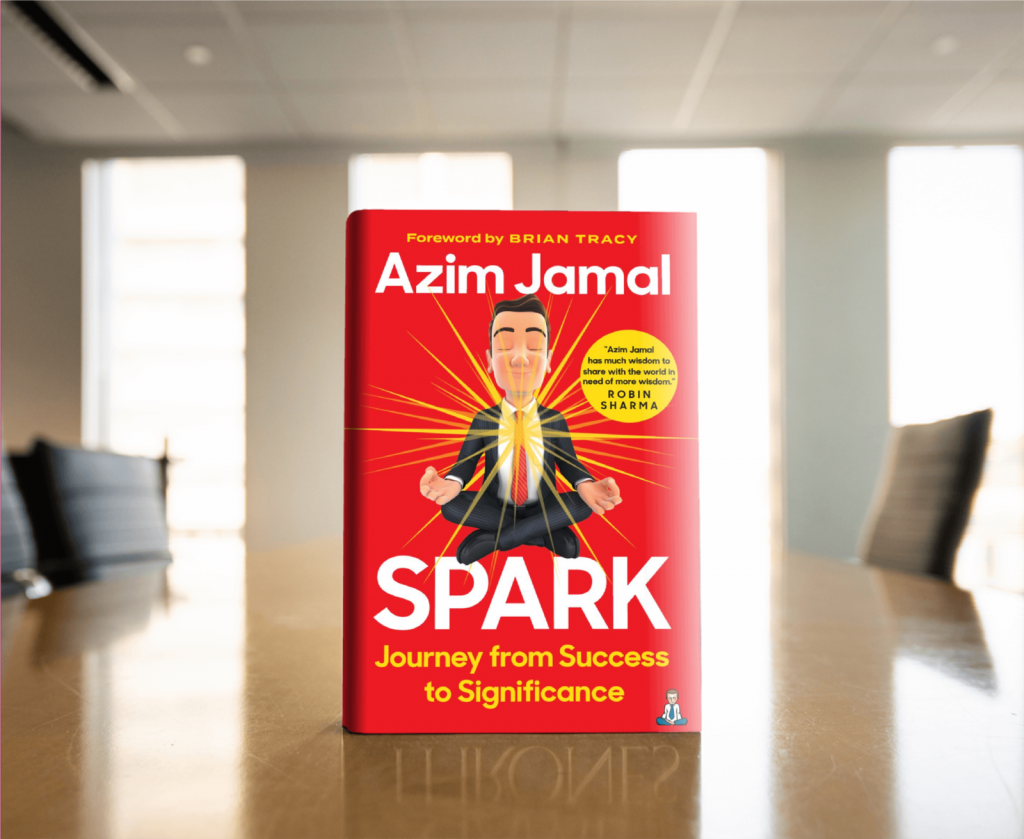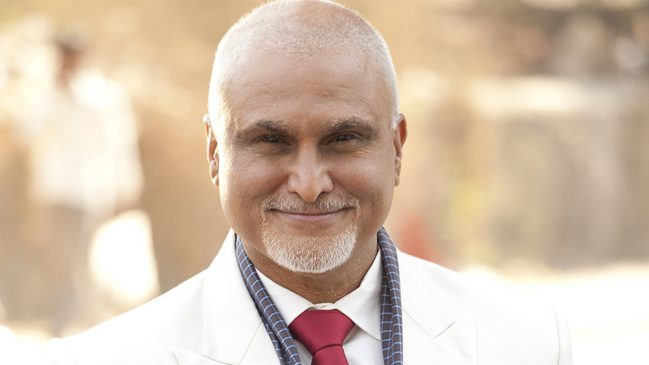Discover your purpose and find fulfillment with Azim Jamal’s latest book, Spark
Learn from the CEO of Corporate Sufi Worldwide and unlock your full potential
A dedicated person is guided by self-awareness and purpose, while a workaholic is guided by the frenzy of activity for the sake of activity.
– Azim Jamal

Azim Jamal is a well-known figure in the world of personal and professional development, inspiring and empowering individuals across the globe to achieve their full potential. As the CEO and founder of Corporate Sufi Worldwide, he has helped countless people to find balance, purpose, and fulfillment in their personal and professional lives. With a dedicated following around the world, Azim’s expertise is widely recognized for its ability to help people make positive and lasting changes in their lives. In his latest book, Spark, he sets out to help young professionals discover their true purpose and find meaning in their work, offering valuable insights and practical advice to guide them on their journey.
Spark is your tenth book. How does it stand apart from the corporate Sufi series?
This is a fable, thus different from most of my other books. The only other book written as a fable was What You Seek is Seeking You (WYSISY), co-authored with Brian Tracy. In WYSISY, the underlying emphasis was on attraction, whereas in SPARK the underlying emphasis is on significance and SPARK. SPARK is an acronym which encompasses S: service, P: purpose, A: attraction, R: resilience and K: knowing. None of the other nine books cover all of these five elements together in one book.
What sparked you to write this particular book?
I have been working with successful people for the past 25 years, and I have learned that they are successful outwardly; however, they still struggle to find purpose, fulfilment, inner happiness, and balance.
This made me realize that it is not success that these people are really looking for—it is significance! Success is personal; you can have wealth, fame, titles and power, but unless you are making genuine impact on others, there’s something missing. That’s what I mean by significance— it means that I am successful but I strive to create impact and make others successful too.

The character Steve, the hotshot lawyer, is thrown one of life’s many curveballs and ends up getting a chance to find greater significance. Is Steve based on someone you know? Or is he more of an archetype created purely to illustrate certain concepts?
An archetype created to illustrate certain concepts. However, he resembles a mixture of people I have worked with around the world. Also I share my personal story at the end of the book, where I reveal that I also went through the five elements of SPARK that Steve went through to find his.
This is a fable that, I believe, many successful people relate to, especially those who realize that their outward and material success isn’t yet complete and they are looking for something more, something deeper. The book will also connect with those who are yet to taste success, by helping them reflect on what it is that they really want to do in life.
The second aspect is how every part of Steve’s journey has a deeper meaning—each part stands for a value that makes up the acronym SPARK described earlier.
The third aspect is the message that is shared after each part of the story. These messages are designed to help you put the story in context of your own life.
The fourth aspect is questions posed at the end of the message. When you ask yourself these questions, you open yourself up to new ideas and possibilities that you had probably never considered before.
And the fifth and final aspect of the book is my own story, which I share at the end of the book because it has parallels to Steve’s story.

You’ve spoken to and touched the lives of 1 million people in 100 cities in 5 continents, so you are no stranger to travel. Do you have a favourite city to visit? Why?
In a heartbeat, San Juan, Puerto Rico! Why? I love the weather and the people. My clients there are like family and friends.
You have said, “In order for an organization to separate itself from the rest of the pack, leaders must invest in themselves and their people.” However, in today’s globalized and competitive world, many businesses struggling to meet staffing needs often look to hire who they need, instead of cultivating and training a candidate from within. Why do you think that remains a trend?
It remains a trend because it takes a certain degree of awareness, honest reflection, and committed focus to develop people from within. But a transformational leader who has invested in creating lasting impact will naturally gravitate towards first cultivating people around him.
In essence, the difference really is between being a transformational leader versus being a transactional leader. The differences include:
● A transactional leader gives tasks to subordinates; a transformational leader coaches and mentors.
● A transactional leader retires subordinates; a transformational leader rejuvenates them.
● A transactional leader micromanages and overpowers; a transformational leader engages, energizes, and empowers.
● A transactional leader prefers being in status quo; a transformational leader positively disrupts and innovates to make things better.
● A transactional leader picks on faults; a transformational leader highlights and praises people for doing things right.
● A transactional leader keeps ordinary people ordinary; a transformational leader makes ordinary people extraordinary.
● A transactional leader works “in” the business; a transformational leader work “on” the business.
● A transactional leader merely creates followers; a transformational leader develops and nurtures more leaders.
● A transactional leader remains in the comfort zone; a transformational leader thinks outside the box, and is creative and innovative.
● A transactional leader relies on worn out practices, whereas a transformational leader relies on best practices.
● A transactional leader creates silos; a transformational leader builds exciting and powerful synergistic teams through amazing team building approaches beginning with creating a common vision and ownership mentality!

What is the difference between being dedicated and being a workaholic? What is the best way to set a professional pace?
A dedicated person is guided by self-awareness and purpose, while a workaholic is guided by the frenzy of activity for the sake of activity.
To allow yourself to be guided by a strong sense of self-awareness and purpose in the professional sphere, you need to apply the 12 best practices, which include:
First things first
First things should never be at the mercy of last things. First things first include things like:
- The Hour of Power, which includes a 20-minute exercise, 20 minutes of meditation, and 20 minutes spent reading something uplifting.
- Spending quality bonding time with close ones.
- Working “on” the business (culture, growing the business).
Quadrant of quality
The quadrant of quality is not the urgent, it is the important! Important things take time, energy, and focus. Thus need to be done earlier rather than later.
Some examples of the quadrant of quality include:
- Creating a common vision for the business or for the family. This is not urgent but important to create focus, energy, unity of purpose.
- Succession planning which is not urgent but important to create mentoring, coaching, grooming to create better leaders.
- Identifying and harnessing high potential employees.
Managing interruptions
If you regard being busy with lots of interruptions as a sign of success, you will get a rude awakening! This does not define success, it is rather an activity trap!
Plan some uninterrupted time early in the morning to get your most important work done. If you can, also plan some uninterrupted time in the afternoon to catch up on important work for the day.
Effective delegation
If you are always blaming the person you are delegating to, then it is likely that the way you are seeing the problem is the problem! You need to look at delegation as a capacity-building exercise, not just a one-time task. Also, having a buffer (an earlier deadline before the real deadline) and a midpoint review can be effective. The illusionary deadline before the deadline gives you one more chance to complete the outstanding matter well, and the midpoint review identifies to red flags, if any, way before the deadline. Important things take planning and proactivity instead of firefighting!
Top three things daily
It is not the thirty things you complete daily that are the game-changers, it is the three really important things that you complete amazingly that are! Plan these three things the night before so your subconscious mind is working while you are sleeping, so early morning you hit the ground running.
If you complete three important things (or mini goals) daily, in a week you do 15, in a month 60, in a year 720!
100% completion
Two or three 100% important completed tasks or jobs are far more valuable than many unfinished jobs. Unfinished jobs take much longer if they are done piecemeal. When you have momentum and you complete the job 100%, you are usually far more efficient. You can invoice a complete job, but it’s much more difficult to invoice an incomplete job. When you leave a job incomplete it takes far longer to complete it later. You have lost momentum and concentration on this important job by your procrastination.
Doing a little extra
Doing a little extra takes your work from being ordinary to extraordinary! For the runner who comes first in a race and the runner who comes second, the difference may only be a neck, yet the rewards of the winner are far higher. Being first takes a bit extra. Important jobs and important clients desire extra-special work and service. You take your service to the next level just by doing a little extra each time, every time!
Valuable time, not linear
Great work is done with valuable time, not with linear time. Idea generation is a valuable time exercise. Planning your work as opposed to attending to it haphazardly is a valuable time exercise. Focusing on linear time is not the key. The key is focusing on valuable time, which leads to superior outcome. When someone says “I worked 14 hours today,” it does not mean as much as someone saying “I put in 8 hours today and created a magical outcome”! At the end of the day, outcome and results matter and they come from doing valuable work.
Beautiful meeting point
Focusing on your vision takes you thinking of the future instead of being totally present now. Being present without a vision or a goal can take you away from your desired destiny. However, having a powerful vision and aligning your activity in the moment to your vision creates a beautiful meeting point. This requires absolute clarity of your vision and amazing focus on task at hand!
Less, slow, small
Less is more:
Doing less of important things is better than doing more of unimportant things. Being in an activity trap leads you to becoming a human doing instead of being a human being. Focus on the essential few instead of the plenty unimportant activities.
Know the essential few and invest time, energy, and focus on the essential few. Do not major in minor things!
Slow is fast
When it comes to relationships, slowing down is speeding up. When a customer or a spouse is complaining, slow down and empathize to speed up the outcome.
If you are going the wrong direction, speeding up will make you get lost faster. Slow down and ensure you are going the right direction to speed up to your direction!
Small is big
Success is in big things, whereas real happiness comes from small things! Driving fancy cars and living in big houses will make you feel successful. Having loving relationships, enjoying quality time with family, living a principle-centred and balanced life will make you feel happier.
10%–90%
You can stretch the Pareto Principle, which states 20% gives you 80% return to 10% giving you 90% return. Finding your top 10% in your business and family takes your priority and execution to the next level. You begin to operate around a tight set of priorities!
Crystal-clear goals
Success is goals, and everything else can be “blah blah blah” without clear goals!
The best soccer players in the world will do little magic if they are playing football on a ground with no goal posts and no clearly defined objectives. These twelve time-management best practices will seem simple in theory. Jim Rohn put it well by saying “what is simple to do is also simple not to do!” Implementation, regular feedback and positive accountability on these tips will start your journey to create lifelong positive habits leading to sustainable success!

You have given countless talks and hosted numerous seminars. One of the most famous is your TEDx talk at Grandview Heights. What was that experience like? Would you like to share any behind-the-scenes highlights?
Doing the TEDx talk was very hard for me because it requires you to memorize your talk and be very disciplined to stick to your script. I am for the most part an inspirational speaker who is poised and speak spontaneously, and usually around what my audience wants to hear. In the TEDx presentation, with the clock stopping at 18 minutes, I actually got two standing ovations in one talk, but we had to cut one to be in the 18-minute mark.
If you could travel back in time and give yourself advice when you were first starting your career, what would it be?
Hire a coach who has been there, to save a lot of duplication of effort. The writing, speaking, and coaching business is a tough one. Even after 25 years of being at it, sometimes I still feel like a rookie!
Where can our readers get in touch with you and find out more
Links – LinkedIn | Facebook | Twitter | Instagram | YouTube Channel



